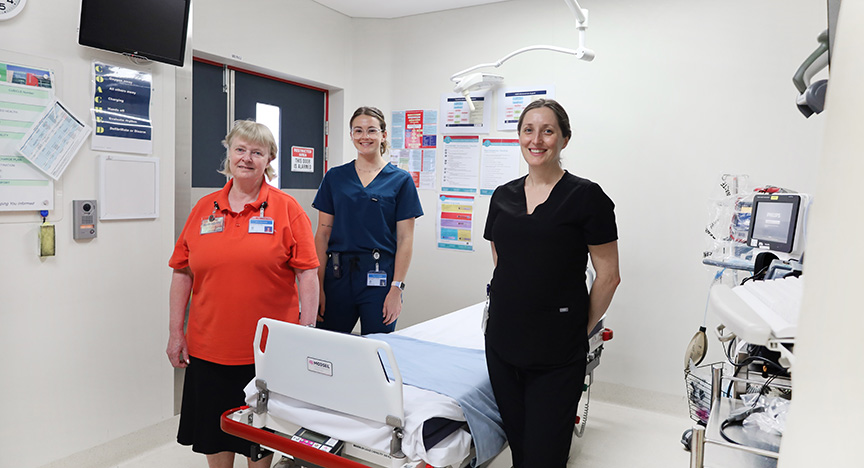
Residential aged care facility (RACF) patients are receiving crucial social supports whilst undergoing treatment at QEII Hospital’s Emergency Department (ED), thanks to a team of dedicated volunteers.
The team of seven volunteers work behind-the-scenes to deliver the Emergency Care Companions Volunteer Program (ECCVP), a joint initiative between the CAREPACT program and QEII ED that offers a range of non-clinical supports including company and friendly chats, warm blankets, snacks, games and diversional aids.
As QEII receives the largest proportion of RACF residents attending ED in the Metro South Health region, Emergency Physician Dr Casey Bennetts says the ECCVP was developed after the team identified a need for a specialised social support service for the hospital’s most vulnerable.
“A significant proportion of RACF residents coming to ED often don’t have company and can experience adverse outcomes such as development of delirium or distress from being in ED,” she said.
“This is an extremely vulnerable cohort of patients who can't always readily express their needs. They're also a group of patients who are at significant risk of having adverse events occur, due in part to their age, but also due to their medical and cognitive frailty. These are the patients that do best by having someone advocate for them and be with them during their encounter, which was our goal in developing this program.”
With a focus on improving the comfort and overall ED experience of vulnerable older patients, Dr Bennetts says the ECCVP provides more than just social benefits to patients.
“Our goal was that by providing some companionship through non-clinical chats, playing checkers, reading magazines together or playing games etc., our residents have a more positive encounter at the ED. In turn, this helps lower the risk of RACF patients developing distress, delirium or agitation during their ED encounter,” she said.
Made up of a combination of local volunteers sourced through QEII Volunteer Services and Griffith University students on placement, the team deliver the specialised service on a variable roster running weekdays between 8.30 am - 4 pm. Patients are screened for suitability by CAREPACT nurses at the start of each day to ensure no resident is left alone during the experience.
“The ED can be quite a confronting experience when the patient is concerned for their health and their well-being and have to do it alone. The environment can feel like a sensory overload for anyone who's not used to it, especially for those who are frail, or who are unable to walk independently or express their needs without assistance. It can be quite a tough environment to be in alone.”
Since its launch in mid-2023, Dr Bennetts says the program’s notable positive impact has been felt among both patients and volunteers, with feedback echoing the program’s success.
“Feedback from the students has been overwhelmingly positive, with students reporting that they feel very supported in the program, but also that they feel like they're doing something valuable and rewarding for aged care residents,” said Dr Bennetts.
“Although many of our RACF residents have cognitive impairment, we've had positive real-time feedback that they've enjoyed the company, and patients have often thanked the volunteers for coming along.”
In light of the program’s initial success, the CAREPACT team have their sights set on expanding the ECCVP to reach more EDs in the MSH region.
“To date the program has run very smoothly, and we've been able to transition to a nurse-led model which has proved very successful. QEII was a good starting platform for this program and given how successful it has been at QEII to date, our hope is to expand it over the whole Metro South HHS over the next few years.”
Congratulations to the CAREPACT team and QEII ED on delivering a highly successful program.